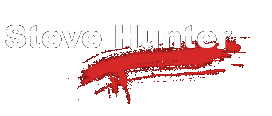
The Deacon of Rock 'N' Roll
Exclusive interview by Devon Jones for SickthingsUK
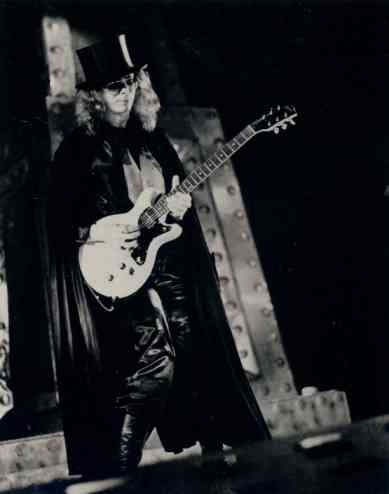
A Comment about Steve Hunter:
I have done several interviews now for SickthingsUK, which were all a great experience, and have to say that this interview was the most delightful and insightful that I have done. Steve Hunter was generous, kind, and very communicative with me throughout this. This interview covers Steve's involvement with Alice Cooper starting with the Billion Dollar Babies album up to the "From the Inside" tour and also covers some of the other other things he's worked on with other artists. I hope that all of you will enjoy the experience of reading this interview as much as I did conducting it. Many thanks to Steve Hunter and to the people who helped me put this together. - Devon Jones
SickthingsUK: First of all thank you for taking time out to answer these questions.
Steve Hunter: That's not a problem. I'm very flattered and humbled to see so many questions. Thank you!
SickthingsUK: So where are you from originally?
Steve Hunter: I am originally from a small town in Illinois called Decatur. I grew up there, went to school there and finally left when I was about 21 years old.
SickthingsUK: Your musical recording career dates back to the early 1970s. What got you started playing music in the first place?
Steve Hunter: I actually started playing lap steel when I was 8 years old. My Dad asked me if I wanted to take music lessons and I originally wanted to play drums. But he sort of persuaded me towards guitar which was my second choice anyway. When I was 12 years old I took up "regular" guitar after having heard Chet Atkins play.
SickthingsUK: Who were your main influences when you first started playing?
Steve Hunter: Well, of course Chet Atkins as I mentioned. I was really amazed at his abilities to make a guitar sound like an orchestra in a way. Of course though as I got older and the music I was listening to changed my influences changed, although I still to this day love Chet's playing. I was influenced later on by the same guitar players everyone else was being influenced by...Eric Clapton in Cream, Jimi Hendrix, Jeff Beck, Jimmy Page, Michael Bloomfield to name a few.
SickthingsUK: Where did the nick name "Deacon" came from?
Steve Hunter: Actually, that came from a joking remark I had made to Bob Ezrin on the phone one time. He had called me for an album project I believe in 1976 which actually might have been Peter Gabriel's first solo album. Anyway, he sort of jokingly asked me if I had developed any bad drug or drinking habits since we last worked together and I said "No, I'm still the Deacon of Rock 'N' Roll." He thought that was very funny and it ended up being my long-time nickname. Which, by the way, I like very much.
SickthingsUK: When you originally started playing, did you imagine that your career would have involved playing with big acts just as you did?
Steve Hunter: Actually, no. I had always thought I would be a doctor and that guitar playing would be simply a hobby. I never really even thought of making a living at it let alone being lucky enough to play with some of the people I've played with. But that all turned around one night. I was in the Army stationed on Okinawa during the Vietnam war. I had entered an all Army talent contest. I had decided to do a Blues tune. It was weird because all of the black guys in the audience booed me because I was a white guy thinking he could play the Blues. Well, as it turned out... by the end of the tune they were cheering and applauding. It was wonderful. At that moment I decided then I would be a professional guitar player. Every decision I made after that was in that direction.
SickthingsUK: How did you meet Dick Wagner?
Steve Hunter: Actually, I had seen his band Ursa Major perform in a club in Florida once when I was out on the road with the Chambers Brothers. We met only briefly then. It was later... even after we had been involved in projects together but still having not met that Bob Ezrin got us together. That was for the Lou Reed tour which ended up with the 'Rock 'N' Roll Animal' and 'Lou Reed' Live records. We immediately hit it off.
SickthingsUK: Alice Cooper has commented many times that you and Dick Wagner were very much among the top guitar teams in Rock N' Roll. This is apparent by many fans with your work in Lou Reed, and the consistent Alice Cooper records up to "Lace and Whiskey." What would you say to this?
Steve Hunter: Well, just like this interview I find it very humbling. I am very proud of the work I have done in the past. And it is strange sometimes because I really didn't think at the time, anyone was really listening. I thought everyone was listening and concentrating on Alice and the show. It is so wonderful to know that there were people listening to us and what we were doing.
SickthingsUK: You had mentioned to me that your very first session with Alice came during 'Billion Dollar Babies' and 'Sick Things'. How did you wind up sitting in with the original Alice Cooper group?
Steve Hunter: That was a Bob Ezrin thing really. By the time 'Billion Dollar Babies' came about Alice was a huge hit with 'Eighteen'. I just got a call one day from Ezrin asking if I wanted to fly to New York to work on the new album and of course I said Yes.
Michael Anselmi asks: Did you have any interaction playing with Michael Bruce or Glen Buxton, or were all of your parts overdubbed later.
Steve Hunter: All of my parts, which were primarily solos, were overdubbed although Mike and Glen were in the studio at the time and were great guys to hang out with.
SickthingsUK: Do you remember which particular tracks you played on for the Alice Cooper Group albums?
Steve Hunter: Well, to be honest with you I would have to go through them track by track. It was a long time ago. I don't know if I could list them here. Sorry. Also, Dick and I traded a lot on like the '..Nightmare' album. I played the opening solo on 'Cold Ethyl' for instance and I think Dick played the solo at the end. I could tell you if I went through each track. Maybe if you could ask me about a specific track?
SickthingsUK: Sure. You had mentioned 'Sick Things' to me before. If there is anything off of the album 'Billion Dollar Babies' that you can think of like “Generation Landslide” or “I Love the Dead” for example?
Steve Hunter: So I went through the album 'Billion Dollar Babies' and as far as I can remember this is what I did on the record:
1) Hello Hooray - lap steel solo in the middle section
2) Raped and Freezin' - second solo after Glenn
3) Billion Dollar Babies - solo #2 (left channel I think) and the solo at the end
4) Unfinished Sweet - slide part before last verse
5) Generation Landslide - solo
6) Sick Things - solo at end
There is a chance I might have played some rhythm guitar parts but I don't know if they were used or not. The parts listed above though were used and are on the record.
SickthingsUK: Many say that your break through in music came when you worked in Lou Reed's band. How much did being with Lou Reed help you to move forward as a musician?
Steve Hunter: Actually, the Lou Reed thing was a big move. But it started really a little earlier than that. I met Bob Ezrin while I was playing with a band in Detroit called "Detroit featuring Mitch Ryder". Bob was slated to produce that album. He and I really hit it off musically. A little further down the road he produced the Lou Reed album "Berlin" and wanted me to play guitar on it. And from what I gather, so did Lou. So, we did the album basic tracks in London.... my first trip to England. I worked with Jack Bruce and Steve Winwood as well as Aynsley Dunbar and B. J. Wilson. Once the album was finished I was asked to do the tour.
SickthingsUK: 1974 rolls around and the original Alice Cooper Group has just gone their separate ways to do solo albums. Bob Ezrin had assembled all of you from Lou Reed's band to help Alice on his new solo project. Can you give us an account of what all happened in the process of recording the new album that ultimately was 'Welcome To My Nightmare' and then ultimately going out on tour?
Steve Hunter: Well, obviously to answer that question would fill a book... which is a possibility as I mentioned. Basically though, the record was a blast to do. Not that we weren't serious.... we wanted to make the best record out there at the time. But we had a blast doing it. It was a remarkable experience for me to work at such a level of professionalism and at the same time have a lot of laughs as well. In many ways, we were all working together building something extraordinary. And I think we became more aware of it as the days went on. There was magic just about every day and I loved it and knew I was in my element. The same thing happened with the tour. The first time I set foot on stage in front of 25,000 screaming people I knew I was "home". I feel more comfortable on a big stage sometimes than I do in a small club. That tour was a wonderful experience for us all I think and I was truly sad when the tour finally ended.
SickthingsUK: From what you knew, was 'Welcome To My Nightmare' initially going to be Alice's lone solo project before possibly rejoining the original group again, or did it appear that he had plans to stay a solo artist in the long haul?
Steve Hunter: Keep in mind I was a "hired side man" so I wasn't in the close loop in a sense. I hadn't really known what had caused the split but from what I gathered it was a permanent one from the beginning. There was never any talk...at least not that I had heard...about Alice rejoining the original band.
SickthingsUK: Many people have suggested the Nightmare band were kept hidden during the show to make people think it was still the original Alice Cooper band. Obviously this wasn't the case as one look at the Wembley film would show, but did you find people were surprised the original band weren't there any more or feel that anyone was trying to hide the fact it was a whole new band?
Steve Hunter: No for sure...I never ever got the sense that the audience didn't realize it was a new band. For one thing the programs sold at the shows had all of our pictures very prominently displayed in it. The show was highly promoted as the Alice Copper show with a new band. I don't think anything was ever done to mislead the public or try to hide anything. We were somewhat hidden on stage simply because of the logistics of the stage itself and for no other reason that I knew of.
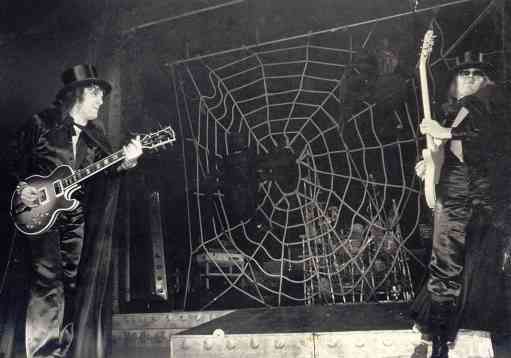
SickthingsUK: Where did the idea of the "Dueling Guitars" come up for from you and Wagner?
Steve Hunter: If memory serves me, we needed something musically to happen at that part of the show for some costume changes and some prop changes. Dick and I decided ourselves to take it to extremes. At that time there were a lot of two guitar bands where the guitar players would trade licks and "duel". I even had a blood capsule in my mouth so it looked... at least to the first 10 rows or so... that I had gotten hit. We always had a blast doing that part of the show.
SickthingsUK: Was it something you had practiced for or was all the playing pretty much improvised?
Steve Hunter: If you are referring to the guitar duel thing... other than the format of the music.... all the soloing was improvised each night.
SickthingsUK: In your words, could you describe the other members of the "Nightmare band?"
Steve Hunter: Well, as you can imagine that's a very tough question to answer. It was a very long time ago really. But I can say this, we did so much work together in various configurations that we really became like a family. At least while we were working together. Often times when we were off the road we all sort of had our own lives. Although for a time, I did share a house with Whitey (Penti) in Toronto since I was there so often. We all seemed to have the same sense of humor (loved Monty Python for instance) and I think we all loved recording and being on the road performing.
SickthingsUK: What has become of the other members?
Steve Hunter: I only know sketchy bits really about everyone. I know Dick Wagner has done some producing and writing for others of course. Whitey is still doing sessions and performances in Toronto. I think Prakash has his own band in Toronto that works all the time. Joey Chirowski I'm really not sure about. I haven't heard much from him over the years. Sorry I can't be more help but we have all gone off on our own tangents over these many years. I think Dick is the one I've been in most touch with.
SickthingsUK: 'Welcome To My Nightmare' proved to be a huge success. Tour and album both. The next album to come out was 'Alice Cooper Goes To Hell.' Can you tell us a little about the formation and recording of that album?
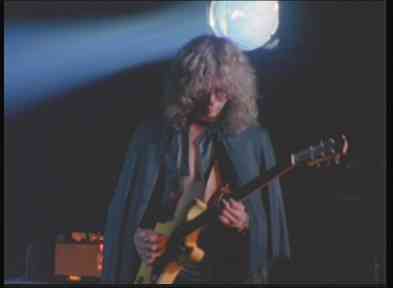 Steve Hunter: Well as you have probably seen, the general idea of the Alice Cooper records from, say, '..Nightmare' through 'Lace and Whiskey', was what we used to call "concept" records. In other words, the record had a general theme that ran through the entire thing. The idea was to put Alice in these bizarre situations and see how he handled them in his own special way. That was the idea I think on 'Nightmare. as well as 'Goes to Hell' and 'Lace and Whiskey'.
Steve Hunter: Well as you have probably seen, the general idea of the Alice Cooper records from, say, '..Nightmare' through 'Lace and Whiskey', was what we used to call "concept" records. In other words, the record had a general theme that ran through the entire thing. The idea was to put Alice in these bizarre situations and see how he handled them in his own special way. That was the idea I think on 'Nightmare. as well as 'Goes to Hell' and 'Lace and Whiskey'.
SickthingsUK: How much if any of the material on 'Goes To Hell' was leftovers from 'Welcome To My Nightmare'?
Steve Hunter: There were no left over tracks. Each song was written specifically for that particular record and to fit that particular concept. So to my knowledge there were no leftovers used for any of the albums I worked on.
SickthingsUK: There was ultimately no tour for this album because of Alice's health in 1976. Stories of the impending "Go To Hell" tour have surfaced. So what from what you knew, what would the Goes To Hell tour had been like?
Steve Hunter: Honestly I have no idea since that was never discussed at all with me.
SickthingsUK: The next album that came out was 'Lace and Whiskey.' A very "quirky" album for Alice. It had elements of an Alice Cooper album never seen before.. Country, a Love Ballad, a parody of a Disco song that ironically turned out to be a good disco song. Where did the idea for such an 'all over the place' album come from?
Steve Hunter: Keep in mind I was literally "just the guitar player" and I'm not saying that to be humble, that was the truth. The concept for Alice's albums as far as I know originated with him, Shep Gordon, and Bob Ezrin. I was not involved in any way with that part of the work.
SickthingsUK: How much of the writing on this album did you get to do?
Steve Hunter: None actually. I wasn't much of a songwriter in those days apart from instrumental stuff (like the Intro to 'Sweet Jane' on the Rock N Roll Animal album). I had no hand in any of the writing.
SickthingsUK: There have been some theories that 'Alice Cooper Goes To Hell' and 'Lace and Whiskey' were recorded in the same session. Some reasons include how similar the production sounds, the cross over of sessions musicians that appear twice on both albums. Can you clarify the recording times for these albums?
Steve Hunter: As I recall, we did at least do the basic tracks pretty much at the same time. I think overdubs were done separately in order to finish the next record being released.
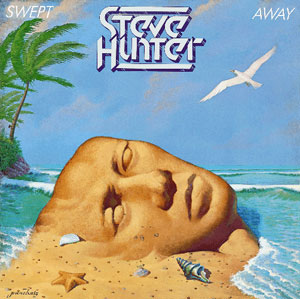 SickthingsUK:
You had your very own solo album at this point called 'Steve Hunter - Swept Away.' Can you tell us what that album is like and who was involved with it?
SickthingsUK:
You had your very own solo album at this point called 'Steve Hunter - Swept Away.' Can you tell us what that album is like and who was involved with it?
Steve Hunter: The album is predominantly an instrumental record although I did... whether good or bad... .sing on a couple of tracks. Bob Ezrin produced it with Brian Christian who also had engineered some of the Alice Cooper stuff. Prakash played bass on it. The legendary drummer Jim Gordon played drums. The late awesome percussionist Jim Mahlen played percussion. Ezrin played some of the keyboard and synth parts. I am very proud of some of the things on that record even to this day. I was getting better at writing I think. I wrote everything except for covers of 'Eight Miles High' and 'Sail On Sailor'.
SickthingsUK: The second leg of the Lace and Whiskey Tour, which was Alice's first "sober" tour, Alice had an entirely new band from the original "Nightmare Band" all of the sudden. Was this a decision by Alice or was this due the rest of you going on to pursue other things?
Steve Hunter: Again, a little tough to remember exactly but I'm reasonably sure it was a combination of both.
SickthingsUK: 'The Alice Cooper Show', Alice's first live album, was released at this time. Alice has often times expressed that he wasn't too happy with how this album came out. What did you think of it?
Steve Hunter: To be honest I think I am inclined to agree with Alice.
SickthingsUK: From the WTMN Tour up to this tour, you and the rest of the band were still "kept back" on stage. This time you were often times hidden by a huge TV Screen. Did you ever feel that you, Dick, and Prakash should be given a little more freedom to move about the stage and to "share" the spotlight?
Steve Hunter: No, I never did feel that. I was a "hired gun" so to speak. And my job was to do whatever was needed to make the show work. The stage was almost entirely used by Alice and the dancers almost all of the time. I think it would have gotten chaotic had we all tried to share it in that way. Besides, it was Alice's show after all... not mine.
SickthingsUK: At this point, you had the likes of Lou Reed, Aerosmith, Alice Cooper, and Peter Gabriel all under your belt. Quite an honorable accomplishment! As a musician, how had you viewed your musical career at this point?
Steve Hunter: Quite frankly at that point I felt I had succeeded in what I was trying to accomplish and was very happy and content with my career.
SickthingsUK: Alice Cooper had released 'From The Inside'. You were part of the tour but not part of the album unfortunately. Why was that?
Steve Hunter: Well, I'm not sure really. I always thought that, like Bob Ezrin, David Foster, who produced that album, had his favorite musicians to work with, whom he could trust and who understood what he was looking for. I always thought that was the main reason. But otherwise I don't know.
SickthingsUK: This was the first tour you had got to share with Alice being sober. What was different about Alice as a sober person than you had remembered before leaving the 'Lace and Whiskey' Tour?
Steve Hunter: Keeping in mind I was fairly naive at the time, I didn't see a huge difference in Alice... at least not in the way he treated me. We had become friends I think and that always felt the same. I think his energy picked up a great deal on the tour though.
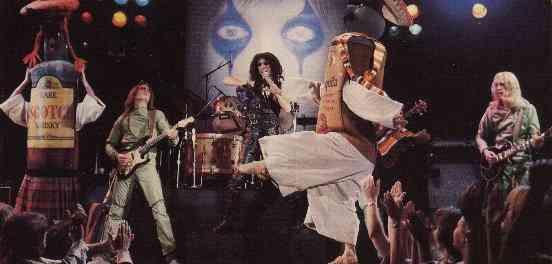
SickthingsUK: The 'From The Inside' tour is said to be one of the best stages and concerts that Alice had done. It had taken on the more "familiar" Alice form. What did you think of it?
Steve Hunter: That's a difficult question to answer but I will try. I think '...Nightmare' was the most fun tour and stage show. But I think 'From the Inside' was probably the most musical in many ways. I loved doing shows and tours with Alice so that's what makes the question difficult. We had lots of fun onstage with the Inside tour also.
SickthingsUK: Yourself, Prakash John, and Penti Glan had returned for this tour. Davey Johnstone and Freddy Mandel had returned from the previous tour as well. What was Davey and Freddy like?
Steve Hunter: Well I had worked with Freddy before and we had already become friends. Davey was a great guy to work with. Another guitar player who was very easy to work with. They both fit right in to the whole thing very well. I still consider them friends although I don't see them much any more. Especially Davey.
SickthingsUK: Was it unusual being back up there with your band mates and Dick Wagner wasn't there?
Steve Hunter: Definitely. Dick and I had worked together all the way back to the Lou Reed days and I had gotten very used to that. But part of being a backup musician is you have to be ready to adapt to new things.... almost all the time.
SickthingsUK: Undoubtedly you and the band noticed Alice was getting thinner and seemed to start singing weaker than normal, practically out of breath and pushing out the words sometimes. From what you remember, behind the scenes was this something all of you in the band, including Alice, had realized would be a problem and did it present any challenges on the tour for you guys?
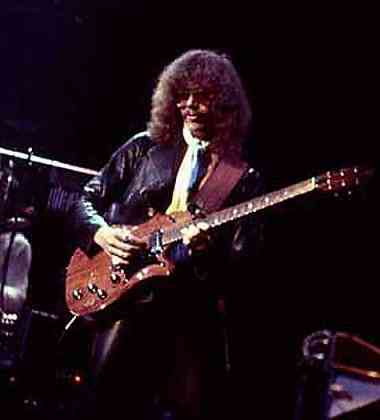 Steve Hunter: Obviously we were aware. But here I can only really speak for myself. I knew something was wrong but I didn't know what. I loved Alice like a brother.... still do.... but I really had no idea what to do about what was going on. Nor did I actually KNOW what was going on. It was sort of one of those things where no one really said anything about it. We all did just try to do the best show every night that we possibly could... no matter what.
Steve Hunter: Obviously we were aware. But here I can only really speak for myself. I knew something was wrong but I didn't know what. I loved Alice like a brother.... still do.... but I really had no idea what to do about what was going on. Nor did I actually KNOW what was going on. It was sort of one of those things where no one really said anything about it. We all did just try to do the best show every night that we possibly could... no matter what.
SickthingsUK: You were involved in the movie and soundtrack to "Rose" with Whitey Glan being apart of that as well. How different was it to do Bette Midler songs after you have been apart of a band with someone like Alice Cooper?
Steve Hunter: That gets back to that adaptability thing again. I knew that if I wanted to play with lots of different artists and musicians I would have to learn how to adapt. Besides, Bette and Alice had lots in common to me. They were both into theater and music combined so it wasn't a really big stretch.
SickthingsUK: When 1980 Rolled around, Alice took a new direction with "Flush the Fashion" and changed his image. This was something that you and the Nightmare band did not get to be a part of and ultimately the last that you and the others (other than Dick Wagner) would get to work with Alice. Was there a reason why you and the others weren't apart of this album?
Steve Hunter: Again, that may be a question you would have to ask Alice. I don't know what the thinking was. I do know that some of the other artists I had worked with before... Lou Reed and Peter Gabriel... often made band changes at some point. That wasn't particularly unusual. So I'm assuming that's what was going on.
SickthingsUK: Now that your time with Alice, musically, was over, what did you take from the experience?
Steve Hunter: Answering that question could fill a book (which by the way, a book from me is a very real possibility). I'll try to give you a couple of good examples though. Number 1... I found out how extraordinarily enlightening it is to play in front of thousands of people. That is a most profound experience and like nothing else I have experienced before. And number 2 I have learned that the most successful people I have worked with, were successful because they went completely "against the grain". No one was doing anything at all like what they were doing at the time they became most successful. There are lots of examples of that in the music business. But I was extremely lucky to work with the ones I did. And I am very grateful for that.
SickthingsUK: On the albums you had worked on with him, how much guitar playing freedom did you get to have on the Alice Cooper Group/Alice Cooper albums?"
Steve Hunter: I'm not sure which particular album you are talking about but I can tell you that when it came to solos and even to parts, I was pretty much left to my own ideas. I think that was part of the reason I got hired to do the work.
SickthingsUK: Would you have liked to have gotten the chance to be more involved in the writing process with Alice, Dick and Bob Ezrin?
Steve Hunter: Most definitely. But as I said earlier my writing skills were very much lacking I think at that time and I don't know if I could have added anything to the process.
SickthingsUK: You went on after this to work with David Lee Roth, Flo and Eddie, Leslie West, Julian Lennon, Mitch Ryder among many others and are still working to this day in music. How do you do it all?
Steve Hunter: The best that I can! Seriously, I have had a deep love affair with music and guitar since I was 8 years old. I cannot do anything else. It is in my soul all the way to my bones and back out again and I will do it until I simply can't do it any more.
SickthingsUK: Since your tenure with Alice, what other projects have you been most involved in?
Steve Hunter: You've mentioned a number of them already. I toured with Tracy Chapman for 5 years and did a couple of CDs with her. That was another lovely experience... getting to play live on stage with Pavarotti in Italy. I've done some film scores... which I would love to do again and am working on that. I also love writing instrumental music so I'm working on that all the time. Anything to do with making music I try to do.
SickthingsUK: Which artists have you enjoyed working with the most?
Steve Hunter: You know... that is a tough and impossible question to answer. Each artist I have worked with has taught me new and exciting things. Each one has been a thrill to work with on stage and in the studio. Usually, you automatically think of the last person you worked with... which in my case was Tracy Chapman. But everyone has been a joy and I can't really pick a favorite.
SickthingsUK: Any that you would like to work with again?
Steve Hunter: Yes... I would gladly work with ALL of them again any time!
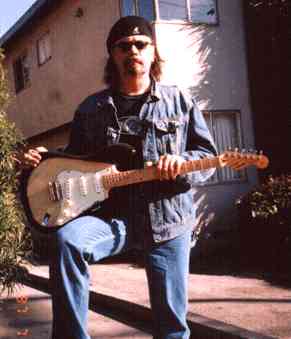 SickthingsUK: So what are you up to now in your musical career?
SickthingsUK: So what are you up to now in your musical career?
Steve Hunter: I am working on writing some things for hopefully a new CD... I'm over due for one! I am seriously considering writing a book about those wonderful days in the 70s. I am also in the process of getting a website up. I'll let you know when that's ready. I have also been teaching part time here in Hollywood at the Musician's Institute...GIT...and I have some private students as well.
SickthingsUK: You are often referred to as a "session musician." Would you say that this is a fair term, or do you consider yourself more than a "session musician?"
Steve Hunter: I have no problem at all being referred to as a session player. I think that has changed somewhat now over the years. I think I am very slowly changing into a solo artist... instrumental artist... but I still love the challenges presented when doing sessions so I rarely turn anything like that down. It's changed somewhat because of the technology however. Now I can do sessions at home with Pro Tools. And I have done on several occasions..... even recording guitars on a CD from an artist from France.
Okay here are some fan questions.
Steve Haynie asks: Did you feel any stigma from people when you told them you played in Alice Cooper's band?
Steve Hunter: That is a terrific question. Yes sometimes I did. It wasn't a lot but I found it more in the music community. Sort of like I was "just" a rock player. And sometimes it made getting other work difficult. So yes there was a little.
Steve also asks: Which signature licks on Alice Cooper songs are yours?
Steve Hunter:I doubt I can remember them all but the most important one that comes to mind is the opening guitar stuff to "Cold Ethyl". That's all mine I am quite proud to say.
Tom Wilson, of Pittsburg's "Mr. Nice Guy" Alice Cooper Tribute band, would like to know what type of Guitar and Guitar Equipment you prefer using.
Steve Hunter: If you are referring to now I have a little collection of all sorts of guitars I use now for various things. I still have an SG...a newer one though. I have a Jeff Beck model Strat. I have an older Taylor acoustic which I love. And an assortment of weird things. As far as amps, I am using primarily Fenders but I am on the prowl for others. Always looking for that tone. And I love stomp boxes of all kinds.
Jay asks: Since Dick Wagner announced that he will be working with Alice Cooper again this fall, would you ever consider working with Alice again as well? Also he would like to know if you have had a chance to play with your fellow Lou Reed/Nightmare Bandmates any since 1979.
Steve Hunter: As to the first question, I would love to work with Alice again. I think it would be a real thrill and a wonderful time so I am very much open to that. And as far as the second question, I played in a little band for a brief moment with Freddy a few years ago. And I sat in with Dick's band in Michigan for a couple of shows but that's about it.
Criss from Australia commented:
First thing I would like to say is "Thanks Steve for all your inspiring playing and writing over the years. You truly changed my life, after I seen you playing, I knew what I wanted to do with my life. I made that dream come true, and without a word of a lie is because of you and Dick Wagner. I thank you from the bottom of my heart.
SickthingsUK: I know Criss isn't alone in such a comment, for you how does it feel to know that you and Dick Wagner were able to inspire people to go on to become musicians?
Steve Hunter: First off, thank you from the bottom of my heart for saying those terrific things. Australia is one of those wonderful places I have yet to visit. It always humbles me to the point of being a bit frightening because as I said a bit earlier, I really didn't think anyone was listening. I just always tried to play the best I could. I know there were people who inspired me. And when I heard them I knew that playing guitar was what I had to do. Now hearing someone else say that to ME... is very soul touching for me. I have often said... the most important people in the music business are the fans... of which I am one! Thank you again Criss that means a great deal to me.
SickthingsUK: Well I think we are at the conclusion of our VERY long interview. Might you give some final words, thoughts, or anything to all of the Alice Cooper/ Steve Hunter fans out there?
Steve Hunter: YOU... the fans.. .the people who are listening... are everything to me. Without you guys I would have had no career. I do not respect anyone in the music business as much as I do the fans. I want you guys to know that. When I am onstage or on a CD playing.. .I am playing to you. I am trying to say something to you.... make you feel something. That's what music is all about. Thank you.